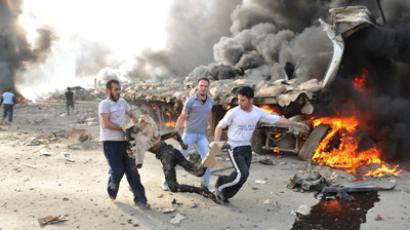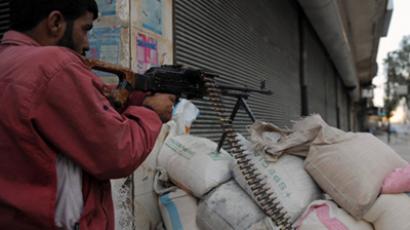Economic ruin further threatens stability of war-torn Syria
The dust is slowly settling in the Damascus, where Syrian govt troops have repelled rebel forces. Authorities are now encountering spasms of social unrest, as residents try to reassemble the pieces of their broken lives.
The fighting in Syria may have shifted north from the capital to Aleppo, the country’s main commercial hub, but it still doesn't take much to spook residents of Damascus. With nerves fraying and budgets tightening, citizens are now forced to cope with the economic hardships that inevitably follow war.Civil unrest could soon be a regular sight in cities across the country, with forces loyal to Bashar Assad being forced to contend not only with the opposition’s guerilla forces, but its own citizens as well.With no safe or clear supply lines, the price of a gallon of gas has quadrupled in the last few months. When a pro-government NGO attempted to distribute fuel at pre-war prices, it found itself overwhelmed by the demand.“Because of all of the ‘special circumstances’ that happened lately, people may be more nervous,” volunteer Taiif Ahmed said to RT correspondent Oksana Boyko. “Of course people have more difficulties getting their supplies. But now everything is getting better.”Life is slowly returning to the Syrian capital, along with the thousands who fled the turmoil of the past weeks. What they find in their ruined neighborhoods is unlikely to inspire much confidence in either of the warring parties. The damage inflicted to Syria’s infrastructure by the clashes is estimated at over $11 billion, roughly 70 per cent of Syria's annual budget.The Assad government has promised to aid in reconstruction efforts, but the sheer scale of destruction, combined with the country’s faltering economy, leaves plenty of unanswered questions. Meanwhile, some Syrians have already lost patience upon returning home and finding their houses gutted and businesses ransacked. “I don’t support the opposition. I want to live here like my father and grandfather. But if the government can't provide us with peace and security, either I'll have to move to another country or the government needs to go,” says Muhammad Adnan al-Buqa'i, a Damascus flour trader who returned home to find all three of his cars destroyed.“All I want is to finish Bashar Assad. Enough of him,” said 15-year-old Damascus resident Ali. All government sympathizers deserve death, Ali says, pointing at the burnt down police car with the charred remains of an officer still inside.The conflict in Syria is both political and generational; the young clamor to fight as the old struggle to find cover. “Their only goal is to drag Syria into chaos. Everything was fine, now it's only getting worse,” said Damascus resident Mahrous Irbiniey.As the fighting in Syria begins to subside, UN Secretary-General Ban Ki-moon announced that a UN observer mission in Syria came under attack by tanks. The incident allegedly happened in a rebel-controlled region near the war-torn city of Homs.The US, meanwhile, is preparing to provide rebel fighters with additional $15 million or more in aid. The Syrian opposition has also called on its foreign backers to supply them with advanced anti-tank and anti-aircraft weaponry.This news comes amid continuing clashes in Aleppo, where both the army and rebel forces are claiming progress.













